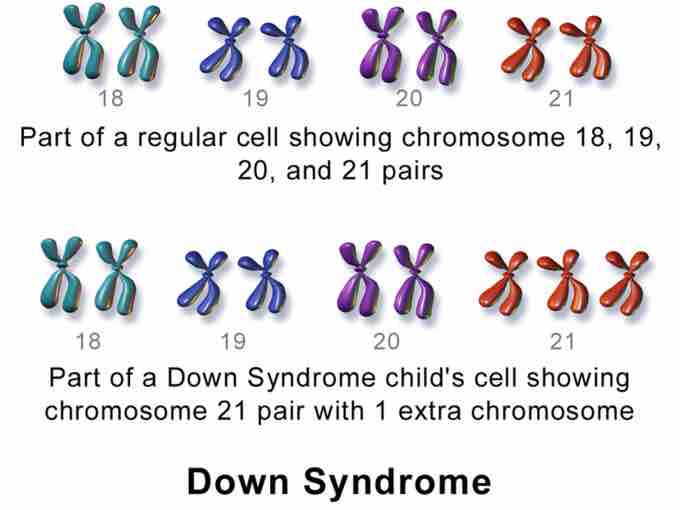An intellectual disability is a significant limitation in an individual's cognitive functioning and daily adaptive behaviors. Disabilities can manifest themselves as limited language, impaired speech, or difficulty performing academically. For many centuries, intellectual disabilities was poorly understood, and so diagnosis and treatment were negligible; until the 2013 release of the DSM-5 (the currently accepted resource for the diagnosis of mental illness), the term "mental retardation" was still in use rather than "intellectual disability."
Individuals are diagnosed with an intellectual disability if they score below 70 on a measure of intelligence such as the IQ test, which has a mean score of 100. The standard deviation on an IQ test is 15 points, which means that a score of 70 is two standard deviations below the mean, or in the bottom 2.2% of the population. An individual must also display deficits in adaptive functioning; have impairments in at least two areas of functioning, such as self-care, social skills, or living skills; and experience the onset of symptoms before the age of 18 in order to be diagnosed as having an intellectual disability.
Types of Intellectual Disability
Intellectual disabilities are categorized by their severity:
- Mild: Approximately 85% of individuals with an intellectual disability fit into this category. These individuals are often able to acquire sixth-grade level academic skills. They also often have the skills necessary to live independently and hold a job, but may need assistance if under unusual stress.
- Moderate: About 10% of people with intellectual disabilities fit into this category. These individuals benefit from social skills and vocational training. They can often learn to travel from place to place independently and hold an unskilled job with supervision.
- Severe: Only 3%-4% of individuals are in this category. They may be able to perform some work with supervision and can often function in a community, living in a group home or with their family.
- Profound: Approximately 1% are in this category. These individuals have fundamental mental impairments and need optimal care, which requires a structured environment with one-to-one supervision by a caregiver.
Causes of Intellectual Disability
Among the common causes of intellectual disabilities are fetal alcohol syndrome and Down syndrome; other contributing factors include certain genetic disorders and exposures to environmental toxins. In every population there is a small percentage of individuals whose intellectual disability has no known cause.
Fetal Alcohol Spectrum Disorders
This spectrum of disorders (FASD) is a group of conditions that can occur in a person whose mother ingested alcohol during pregnancy. Fetal alcohol syndrome (FAS) is the most severe disorder on this spectrum, and it is the leading cause of intellectual disability. This syndrome is caused when alcohol crosses the barrier of the placenta in a pregnant woman and damages the developing brain of the fetus. Alcohol exposure presents a risk of fetal brain damage at any point during a pregnancy, since brain development is ongoing throughout pregnancy. FASD is estimated to affect between 2% and 5% of people in the United States and Western Europe. FAS is believed to occur in between 0.2 and 9 per 1000 live births in the United States.
Down Syndrome
Down syndrome, also known as trisomy 21, is a genetic disorder caused by the presence of a full or partial third copy of chromosome 21. It is typically associated with physical growth delays, a particular set of facial characteristics and a severe degree of intellectual disability. Down syndrome is one of the most common chromosome abnormalities in humans, occurring in about one per 1000 babies born each year. The average full-scale IQ of young adults with Down syndrome is around 50.

Down Syndrome
Down Syndrome is a genetic disorder caused by the presence of all or part of a third copy of chromosome 21.
Education and proper care have been shown to improve quality of life for individuals with Down Syndrome. Some children with Down syndrome are educated in typical school classes, while others require more specialized education. Some individuals with Down syndrome graduate from high school and a few go on to post-secondary education.
Challenges Caused by Intellectual Disability
Individuals living with intellectual disabilities face both personal and external challenges in life. A child with an intellectual disability may learn to sit up, crawl, walk, and talk later than other children. Individuals with intellectual disabilities may experience difficulty learning social rules, deficits in memory, difficulty with problem solving, and delays in adaptive behaviors (such as self-help or self-care skills). They may also lack social inhibitors. Everyday tasks that most people take for granted, such as getting dressed or eating a meal, may be possible, but they may also take more time and effort than usual. Health and safety can also be a concern; for example, knowing whether it is safe to cross a street could pose a problem for someone with an intellectual disability. The exact combination of challenges varies from one person to another, but it typically involves limitations in both intellectual and daily functioning.
Society itself also poses challenges. People with intellectual disabilities are often discriminated against and devalued by society. This has improved over the twentieth and twenty-first centuries, but many individuals with disabilities still face being stigmatized in everday life. Person-centered planning seeks to address this problem by encouraging a focus on the person with intellectual disabilities as someone with capacities and gifts as well as support needs. The self-advocacy movement promotes the right of individuals with intellectual disabilities to make decisions about their own lives.